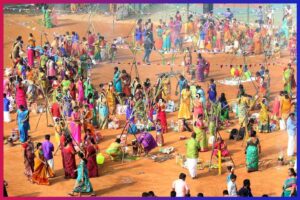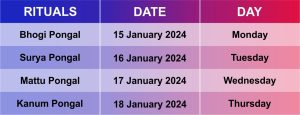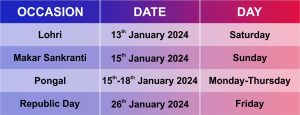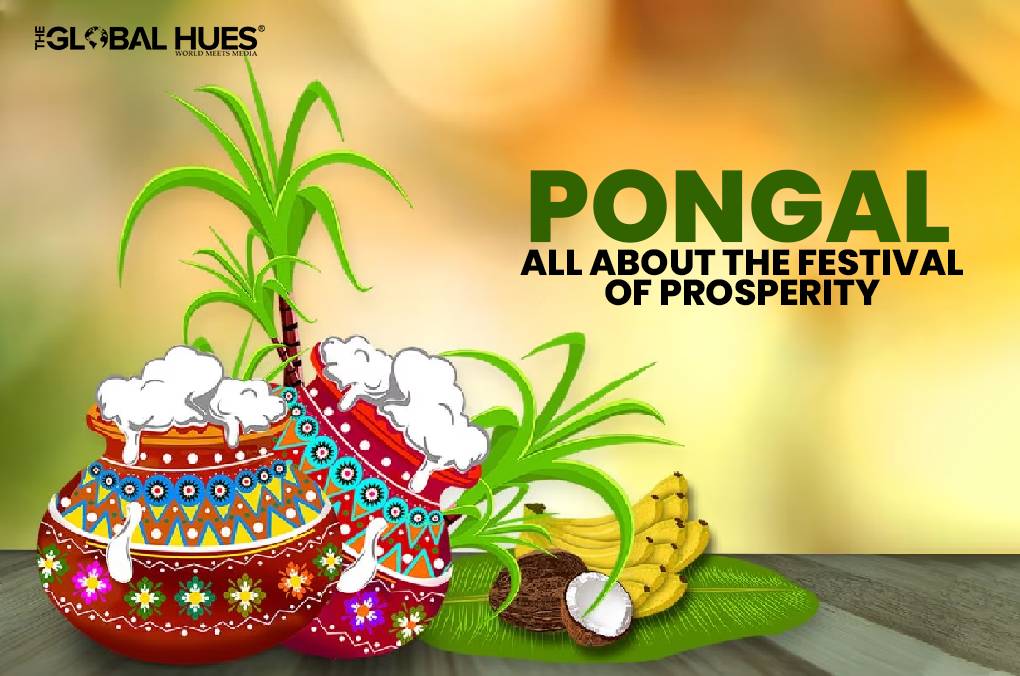Highlights
-
Southern States like Kerala, Tamil Naidu, Andhra Pradesh and Karnataka celebrate Pongal.
-
It is a harvest festival, which represents happiness and wealth.
-
Pongal coincides with Makar Sankranti, which signifies the Sun’s movement from Sagittarius to Capricorn.

Pongal is a festival of happiness and prosperity. It is celebrated in South India and mainly in Tamil Nadu, Andhra Pradesh, Karnataka and Kerala. Pongal is celebrated at the same time in South India when North India celebrates Makar Sankranti. According to the Tamil calendar, Pongal falls in the month of Thai. Pongal is starting from 15th Jan 2024 to 18th January 2024.
Significance of Pongal
Celebrated during the solar equinox, the four days of Pongal is also known as Uttarayanam and Thai Pongal. In Tamil, Pongal means “boom” or “to boil”. In South India, Pongal marks the beginning of the new year because during this time Sun moves out of Sagittarius and enters Capricorn. Pongal is one of the most important harvest festivals of South India in which people offer prayings to the Sun God to bless them with a good harvest and prosperity.
People consider it auspicious to pray for rain, sunlight, agriculture and nature during Pongal. On the occasion of Pongal, people decorate their homes, perform rituals of bathing, wish their friends & family and exchange gifts to express their gratitude and happiness. On Pongal, people prepare scrumptious and delicious dishes and enjoy them together. Some of the special dishes that people make on Pongal are Sugarcane Pongal, Ven Pongal, Tamarind Rice, Medu Vada and many more.
In Southern India, people believe that Pongal brings happiness, prosperity and godspeed into the lives of people. This is why this is also the most auspicious time for wedding ceremonies.
The celebrations of Pongal take place on different days:

All four days of Pongal have their own importance and significance:
Day 1: Bhogi Pongal
On the day of ‘Bhogi Pongal’, people offer their prayers to Lord Indra and seek his blessing for rain yielding a good harvest. They celebrate Bhogi Pongal by cleaning and decorating their houses.
Day 2: Surya Pongal
On the day of ‘Surya Pongal’ or ‘Thai Pongal’, people worship the Sun God. They seek the blessing of the Sun God by offering milk and jaggery. Surya Pongal is observed as the main day of a four-day-long festival. Sakkararai Pongal and other sweet dishes are made on this day.
Day 3: Mattu Pongal
On the third day of Pongal, people worship cattle like cows, bulls and other farm animals that play a significant role in contributing to agriculture. It is known as Mattu Pongal.
Day 4: Kaanum Pongal
The fourth day is Kaanum Pongal. It is a day of enjoyment and joy. On this day, people greet their friends & family and exchange gifts and sweets.
Mythological Tale Behind Pongal
Two mythological stories are associated with the festival of Pongal. One famous story behind Pongal is of Lord Krishna and Lord Indra. Once upon a time, Lord Indra flooded the village of Gokula out of rage. Then, Lord Krishna lifted the entire mountain of Govardhana on his little finger and saved the people of Gokula. And finally, God Indra forgave the people of the village and redeemed them with prosperity.
Another story associated with Pongal is the story of Nandi, the bull of Lord Shiva. According to Hindu mythology, Lord Shiva asked Nandi Ji to go to Earth and spread the message to people that they should eat once a month and bathe daily. But Nandi did the opposite and conveyed the wrong message to the people that they should eat every day and bathe once a month. This enraged lord Shiva and he cursed him to forever live on Earth and help people to plough the land to produce more food to fulfil their needs. This is also the reason why people worship bulls on this day.
Festivals/Days in January





